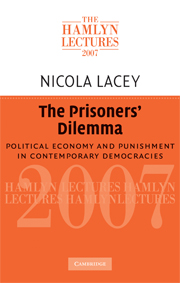Book contents
- Frontmatter
- Contents
- The Hamlyn Trust
- The Hamlyn Lectures
- List of figures
- Preface
- Part I Punishment in contemporary democracies
- Part II Prospects for the future: escaping the prisoners' dilemma
- 3 Inclusion and exclusion in a globalising world: is penal moderation in co-ordinated market economies under threat?
- 4 Confronting the prisoners' dilemma: the room for policy manoeuvre in liberal market economies
- Bibliography
- Index
4 - Confronting the prisoners' dilemma: the room for policy manoeuvre in liberal market economies
Published online by Cambridge University Press: 31 January 2011
- Frontmatter
- Contents
- The Hamlyn Trust
- The Hamlyn Lectures
- List of figures
- Preface
- Part I Punishment in contemporary democracies
- Part II Prospects for the future: escaping the prisoners' dilemma
- 3 Inclusion and exclusion in a globalising world: is penal moderation in co-ordinated market economies under threat?
- 4 Confronting the prisoners' dilemma: the room for policy manoeuvre in liberal market economies
- Bibliography
- Index
Summary
In the last chapter, I argued that there is reason to believe, as well as to hope, that many of the co-ordinated market economies of the corporatist and social-democratic countries of northern Europe and Scandinavia may be able to resist the development of a ‘culture of control’. But what might the future hold for the more individualistic liberal market economies? This is the question to which I turn in this final chapter.
We have seen at several points in this book that the USA is an extreme case of an individualistic, unco-ordinated liberal market economy. So it is no surprise that it is the USA which exhibits the most extreme levels of punishment – levels which have, moreover, continued to rise notwithstanding a sustained drop in crime (see Figure 16). It would take a social scientist far more skilled, and more optimistic, than I am, to throw out any recipe for the reversal of American mass imprisonment. All kinds of political economy are dynamic, evolving over time in response to the changing opportunities and demands presented by their environment. Even for the USA, one has to hope that the current track is not irreversible. For example, one might question whether the scale of social polarisation represented by the current US equilibrium is really sustainable over time, at least within a democratic framework. As Bowles and Jayadev – perhaps over-optimistically – observe, ‘illegitimate inequalities are costly to sustain. While cultures often justify vast differences in power and access to valued resources, the mind is not a blank slate on which such ideas as the divine right of kings or the superiority of the “white race” can be etched at will. Two decades of behavioural experiments have provided convincing evidence that humans in diverse cultures are inequality-averse, and that violations of fairness or reciprocity norms provoke costly conflicts.’
- Type
- Chapter
- Information
- The Prisoners' DilemmaPolitical Economy and Punishment in Contemporary Democracies, pp. 170 - 206Publisher: Cambridge University PressPrint publication year: 2008

